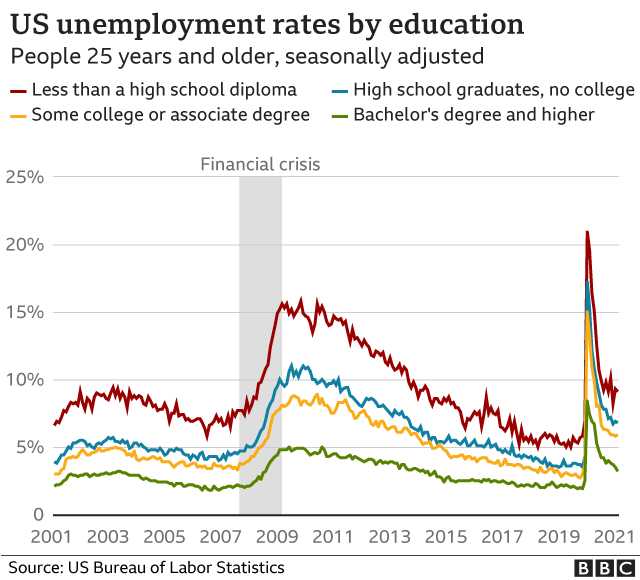The fight to find work: ‘I’ve applied for 200 jobs’
- Published

Paris Ghazi (L) and Jeannie Yamazaki (R) recently graduated from Cornell University
Paris Ghazi and Jeannie Yamazaki graduated from Cornell University last month, having spent four years living together as roommates.
From decorating a room to picking which TV show to watch, the 22-year-olds' approach has differed on certain things. The same goes for job-hunting.
Paris estimates that she's applied for upwards of 200 jobs across journalism, healthcare and the legal industry. She's waiting to hear back from potential employers on two offers.
"Some days I question whether I even have that job... I hope that by end of the month I'll have a start date for a position that I'll be taking on, but I don't feel very firm in my footing. There's not much for me to hold on to right now."
Jeannie, on the other hand, has submitted just three applications - choosing to target her efforts on roles in education.
Although she has plans for a road trip and to work on a farm in rural Japan this summer, job-hunting has brought up difficult questions.
"There's sometimes a pressure to define yourself through what you do... It's not just about career prospects or getting the income you need to survive… sometimes it feels like: 'Who am I now?'"
'Fierce competition'
The good news for new graduates like Paris and Jeannie is that job prospects are improving as the US emerges from lockdown.
The number of entry-level jobs and internships posted on LinkedIn in April saw a 3.3% year-on-year increase, according to exclusive data the job search website shared with BBC News.
"We've come from it being a tough and challenging time last year, to having plenty of jobs now and looking to see if applicants come back on-stream," says LinkedIn's chief economist, Karin Kimbrough.
But competition among young job-seekers is fierce.
Recent graduates may be competing with those who were forced to put off plans because of the pandemic. And, lockdown has made remote roles more desirable.
Ten tips for getting your dream job
"We're also seeing a very high level of competition for internships in particular," adds Ms Kimbrough.
"I think that's by and large people chasing the best and right roles," she says, with healthcare and property jobs proving popular.
For Paris, a lack of feedback on applications and muted responses during Zoom interviews have been disheartening.
"I wonder if the reason why I haven't heard back yet is if some jobs are waiting for another applicant to accept them… It's really hard to know how competitive a job is because it's all digital."
Paris and Jeannie both acknowledge they are "fortunate" to be going into the world of work from a top university.
But Paris adds: "I don't necessarily feel like I'm safe in a job hunt", particularly in comparison with those who have more work experience or a Master's degree.
Barriers to finding a job
While young people have been hit hard by the pandemic, those who didn't go to university were most likely to see their jobs or hours cut.

Muri Johanson grew up in Ithaca, the city that's home to Cornell University.
After leaving high school, the 22-year-old mainly worked in hospitality jobs "without room for learning, improving or for promotion".
When Covid hit, she lost her apartment, odd jobs and a fledgling massage business she had poured her savings into.
It was back to square one, Muri says.

Muri says she struggled to find work after the pandemic hit.
"Many of the jobs I saw - even applying would be going against the grain as someone without that education background.
"I didn't have a lot of experience and a lot of employers weren't interested in giving that to me."
Eventually she got a work placement at a shop called Significant Elements that salvages furniture through a "Job LINK" programme. It's run by the Tompkins County office for employment and training and aims to get young people from disadvantaged backgrounds into work.
Jackie Mouillesseaux, its director, says: "Any young people, like Muri, who were facing a barrier of some sort before the pandemic saw that significantly increase during it."
For now, Muri is enjoying learning about the business and hopes to start her own again someday.
She also hopes that the pandemic may bring about some positive changes: "Working from home seems to have changed culture a lot - so people's lives are more included.
"It's exciting to see the workplace could change to allow people to be more themselves."
- Published24 May 2021

- Published11 March 2021
